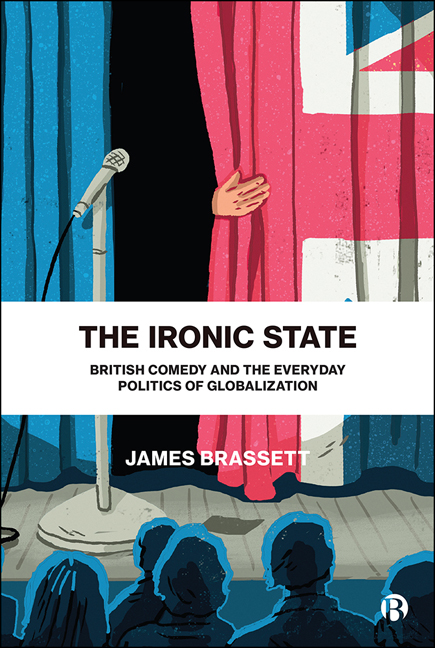Book contents
- Frontmatter
- Contents
- Acknowledgements
- Introduction: Comedy and the Politics of (Global) Resistance
- 1 Everyday Comic Resistance in Global Context
- 2 The Satire Boom: Imperial Decline and the Rise of the Everyday Elite
- 3 Alternative Comedy and Resistance to ‘Thatcher’s Britain’
- 4 Irony and the Liminality of Resistance
- 5 Austerity and the Rise of Radical Comedy
- 6 Brexit, or How I Learned to Stop Worrying and Love the Single Market
- 7 The Globalization of Comic Resistance?
- Bibliography
- Index
6 - Brexit, or How I Learned to Stop Worrying and Love the Single Market
Published online by Cambridge University Press: 04 January 2022
- Frontmatter
- Contents
- Acknowledgements
- Introduction: Comedy and the Politics of (Global) Resistance
- 1 Everyday Comic Resistance in Global Context
- 2 The Satire Boom: Imperial Decline and the Rise of the Everyday Elite
- 3 Alternative Comedy and Resistance to ‘Thatcher’s Britain’
- 4 Irony and the Liminality of Resistance
- 5 Austerity and the Rise of Radical Comedy
- 6 Brexit, or How I Learned to Stop Worrying and Love the Single Market
- 7 The Globalization of Comic Resistance?
- Bibliography
- Index
Summary
Introduction: Politicizing comedy
British comedy emerged in relation to some important political questions, imperial decline, deregulation, globalization and, more reflexively, the ethical ambiguities entailed in comedy itself, for example, over class, race, gender and so on. On this view, comedy is an everyday vernacular of resistance through which global politics is known, legitimated and contested. Less a tool, than a space of politics in its own right. Indeed, the previous chapter argued that radical comedy foregrounded a politics of agency within the (affective) context of global market life. While potentially more engaging (and responsible) than the ironic form that preceded it, the popularity of radical comedy also created its own limits, of race, gender and ‘celebrity’. Indeed, it arguably commodified a type of anti-austerity critique that increasingly manifested in the public sphere. Suddenly, the ‘anti-establishment’ anger of radical comedy was celebrated – and facilitated – by social media platforms, satirical memes and hashtag politics. We are all satirists now.
If British comedy is an important and productive element in the politics of globalization, then it might have been expected to play a pivotal role in the politics of Brexit. The famously unexpected British vote to leave the European Union (EU) was widely seen as a challenge to cultural values of social inclusion and progress, values that arguably resonate with (the self-identity of) British comedy. Yet, for many, the actual experience of comedy after Brexit has been a disappointing failure. On the one hand, the instrumental critique looms large, that, despite an overwhelming comic turn against Brexit, rather obviously, the plethora of anti-Brexit jokes did not manage to affect the result of the referendum. On the other hand, more critically, the routine practice of joking about the ‘folly’ of Brexit, the ‘stupidity’ of its leaders, as well as the commonly referenced ‘ignorance’ and ‘racism’ of ‘the Leave voter’, rather had the effect of entrenching division.
In this way, the global event of Brexit saw profound challenges levelled ‘at’ comedy itself. For so long the bastion of liberal left resistance, the vote to leave the EU set off a period of palpable disquiet over the substance and political value of comedy and satire.
- Type
- Chapter
- Information
- The Ironic StateBritish Comedy and the Everyday Politics of Globalization, pp. 119 - 138Publisher: Bristol University PressPrint publication year: 2021



